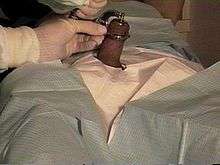Gomco clamp
A Gomco clamp, otherwise known as a Yellen clamp,[1][2] is a specialized clamp for performing circumcisions. It was invented by Hiram S. Yellen and Aaron Goldstein in 1934-1935.[3][4] Gomco stands for the GOldstein Medical COmpany, the original manufacturer of the clamp.[2] In a 1998 study, it was the preferred circumcision technique of 67% of US physicians.[5]
Method

The technique is as follows:[6]
- Anesthetic should be applied (though it is an historically recent addition, dating only to approximately the early 1990s).
- The foreskin is gripped with two hemostats (tissue holders) and a probe is inserted between the foreskin and glans to break any adhesion.[7]
- Once separated, a hemostat is used to crush the foreskin lengthwise in order to reduce bleeding.[7]
- Next, the foreskin is cut lengthwise where it was crushed to allow space to insert the clamp.[7]
- The bell of the clamp is placed over the glans, and the foreskin is pulled over the bell.
- The base of the clamp is placed over the bell, and the clamp's arm is fitted.
- After the surgeon confirms correct fitting and placement, and the amount of foreskin to be excised, the nut on the Gomco clamp is tightened, causing the clamping of nerves and blood flow to the foreskin.
- The clamp is left in place for about five minutes to allow clotting to occur, then the foreskin is severed using a scalpel.
- The clamp's base and bell are then removed from the penis.
Advantages
- The circumcision scar is straight.
- Most of the inner foreskin can be removed.
- The circumcision is relatively quick compared to the more recent Plastibell.
Disadvantages
- Involves several small parts, all of which must be sterile so as to ensure the safety of the patient and minimize the risk of infection.
- Procedure takes longer than the traditional Jewish Shield or Mogen Clamp techniques.
- The scar is more visible than a Plastibell.
- A gomco circumcision often results in a tighter and generally more destructive circumcision, as the incision cannot be angled to be adjacent to the glans, with the gomco clamp only going in a straight line around the shaft of the penis. By contrast, A Mogen clamp can be positioned on a slant to preserve the frenulum and line up perfectly with the glans, which has a shape which slants up as you go from the dorsal(front) to the ventral(back) side.
Prevalence
United States

Probably over 75% of circumcised American men born between 1950 and 1980 were circumcised with a Gomco clamp or a variant. The presence of a light brown ring, typically one inch behind the corona, probably indicates a Gomco circumcision.
A 1998 survey found that the Gomco clamp is the preferred technique by 67% of American physicians, whereas PlastiBell (Hollister, Inc, Libertyville,IL) is used by 19% and the Mogen clamp by 10%. An equal percentage of Gomco and Plastibell users (55%) used some form of anesthesia, whereas only 33% of physicians using the Mogen clamp did. There were no significant differences in the distribution of the various methods of anesthesia across the three clamp groups.[8]
See also
Notes and references
- ↑ Warner, E; Strashin, E (1981). "Benefits and risks of circumcision". Canadian Medical Association journal. 125 (9): 967–76, 992. PMC 1862490
 . PMID 7037142.
. PMID 7037142. - 1 2 Gelbaum, I (1993). "Circumcision Refining a traditional surgical technique". Journal of Nurse-Midwifery. 38 (2): 18S–30S. doi:10.1016/0091-2182(93)90093-V. PMID 8387102.
- ↑ Hodges, Frederick (1997). "A Short History of the Institutionalization of Involuntary Sexual Mutilation in the United States". In Denniston, George C.; Milos, Marilyn Fayre. Sexual mutilations: a human tragedy. Springer. p. 26. ISBN 978-0-306-45589-6.
- ↑ Alanis, Mark C.; Lucidi, Richard S. (2004). "Neonatal Circumcision: A Review of the World's Oldest and Most Controversial Operation". Obstetrical & Gynecological Survey. 59 (5): 379–95. doi:10.1097/00006254-200405000-00026. PMID 15097799.
- ↑ Stang, H. J.; Snellman, L. W. (1998). "Circumcision Practice Patterns in the United States". Pediatrics. 101 (6): e5. doi:10.1542/peds.101.6.e5. PMID 9606247.
- ↑ Peleg, David; Steiner, Ann (1998). "The Gomco Circumcision: Common Problems and Solutions". American Family Physician. 58 (4): 891–8. PMID 9767725.
- 1 2 3 HealthWise Medical Reference, Available online at: http://children.webmd.com/tc/circumcision-what-happens-during-a-circumcision Last Updated: February 19, 2008.
- ↑ A Comparison of the Mogen and Gomco Clamps in Combination With Dorsal Penile Nerve Block in Minimizing the Pain of Neonatal Circumcision
External links
- Historyofcircumcision.net: The Gomco clamp
- Stanford University: Infant Circumcision: Gomco Technique (Video)